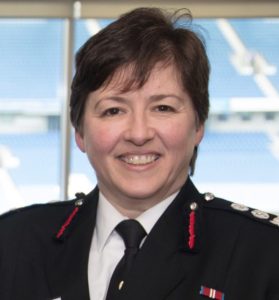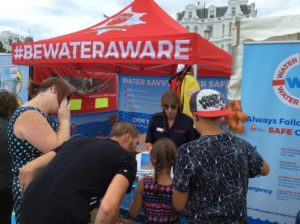Next we see the launch of Drowning Prevention Week 2018. So we were delighted when Dawn Whittaker , Chief Fire Officer of East Sussex Fire and Rescue Service and NFCC UK National lead for Water Safety and Drowning Prevention, shared a few minutes of her valuable time to tell us a bit more about the week, water safety in general and the specific issues for the autism community!
PatientTalk.Org Why is drowning prevention education so important?
Ms Whittaker- Drowning Prevention and Water Safety education is vital because the World Health Organisation (WHO) identified in their Global report that around 370,000 drown worldwide each year. Drowning was also noted as one of the top ten leading causes for the death of children and young people in the world.
Whilst the issue is most acute in developing countries, the National Water Safety Forum for the UK have also identified the need for improved education in the UK. In 2016 658 people drowned in the UK, with around 300 of those deaths due to accidental causes…drowning is preventable and we want people to enjoy water safely.
Education is key as we want more people to be aware of the risk factors that lead to drowning and that was one of the key reasons behind the publication of the UK’s first Drowning Prevention Strategy in February 2016. (See image below)
The education programme we are involved in not only seeks to interact with children and young people, but adults, parents, land owners and other organisations and partners with influence and interest in improving water safety and drowning prevention.
PatientTalk.Org What sort of things should be people be doing to improve the water safety of themselves and others?
Ms Whittaker- I guess the answer to this varies depending on who we are speaking to, for example what local authorities or land owners can do is different to a member of the public, or to education providers…but if we assume that the question is directed for a member of the public
If you are a parent
You should talk to your children about water safety, just as you would with road safety or fire safety. There is a lot of advice about age specific education on various web sites such as RNLI, ROSPA, RLSS, Canal and River Trust and your local Fire and Rescue Website.
Also as a parent its important to ensure your child’s school is offering some input on water safety through PHSE. Please ask your school about this.
Teaching children to swim is a vital skill, not only for health and enjoyment, but also to teach floating skills, and possibly rescue skills may save their own or another’s life. Many schools have stopped providing swimming lessons and so the role of parents is even more vital now. It is a fact that only 45% of children at age 11 can swim further than 50metres and the UK are lagging behind other European countries in providing this core life skill.
Supervision is key, young children who are unaware of risk can get into difficulty in water even in the home setting, in the bath, in a paddling pool or in a garden pond.
Every adult can share Information and seek to understand the risks
Open Water ( the sea, rivers, canals, lakes etc..) can be a powerful medium, and ensuring we are all aware of the risks is a key thing people can learn. Many would perhaps assume that those that drown in the UK intended to be in the water, but got into difficulty, that is not the case.
Many adults put themselves in danger by taking risks and not calling the appropriate help …for example when rescuing a dog from water or assisting someone else in difficulty because they have a poor understanding of the risks.
Our campaign seeks to share information and is backed up by demonstrations ( for example of rescue techniques), by education programmes ( delivered in partnership) to schools, colleges, university’s and at water-side locations around the UK.
PatientTalk.Org Why is drowning more common on people on the autism spectrum and , are there any ways, which you work with the autism community? Are there any specific resources available for people on the autism spectrum?
Ms Whittaker- There are several reports from the US and Canada about this issue, however the UK based studies are limited.
The 2016 Welsh Assembly report – review of child drownings did point to some health and condition correlations and other reports have tended to focus on attention deficiency disorders as having correlation for higher ratios of child injuries.
Without sound basis for medical research into this point, we can only point to symptomatic links. It is highly probable that anyone that has a reduced perception of danger or has difficulty when exposed to new situations maybe at increased risk.
It is noted in some reports that a fascination with water or looking at reflections may lead to increased risk if children or vulnerable adults are unsupervised, but these are observations only.
The National Autistic Society point to educational techniques that involve clear and unambiguous messages that don’t create alarm or anxiety and also involve practice, so we have tried to consider this in our programme, using images in balance with words on posters, using rope throwing training in our public events and safety events, which can easily be repeated at home.
The educational needs of people on the autistic spectrum vary widely and also with their age and not all people cope well with learning in busy social situations, so its important we are able to vary training and exposure. The Fire and Rescue Services across the UK have access to a national toolkit and expertise to assist and we would encourage people to get in touch with their local service…with the community safety lead to find out what is available in their area.
There is further work to be done in this area, working with organisations such as NAS and health professionals and parents to ensure we help meet the educational needs of all.
PatientTalk.Org What are the goals of Drowning Prevention Week 2018 – where can people go for more information?
Ms Whittaker- The goals of the National Fire Chiefs Council (NFCC) water safety and drowning prevention week, which happens in April each year are fairly straight forward, we want people to BE WATER AWARE ( see banner image with dates )
1. To share information to increase awareness about water risks
2. To encourage people to attend events held around the UK to understand what the Fire and Rescue Service and other partners (RNLI, Lifeguards, Coastguards, Search and Rescue teams…etc) do when someone gets into difficulty in water ( see image below)
3. To ensure people know what to do when either they, or someone else gets into difficulty in water
People can get information directly from their local Fire and Rescue service about the campaign and also there will be lots of posters and images on social media Twitter @NFCC_FireChiefs and Facebook.
Parents can also find information on the National Water Safety Forum website, and from organisations like the RNLI, the Canal and Rivers Trust, the Royal Lifesaving Society (the UK Drowning Prevention Charity).
PatientTalk.Org What one piece of advice would you give to somebody about water safety?
Ms Whittaker- Learn the risks and ensure that you and those you care about enjoy water safely


